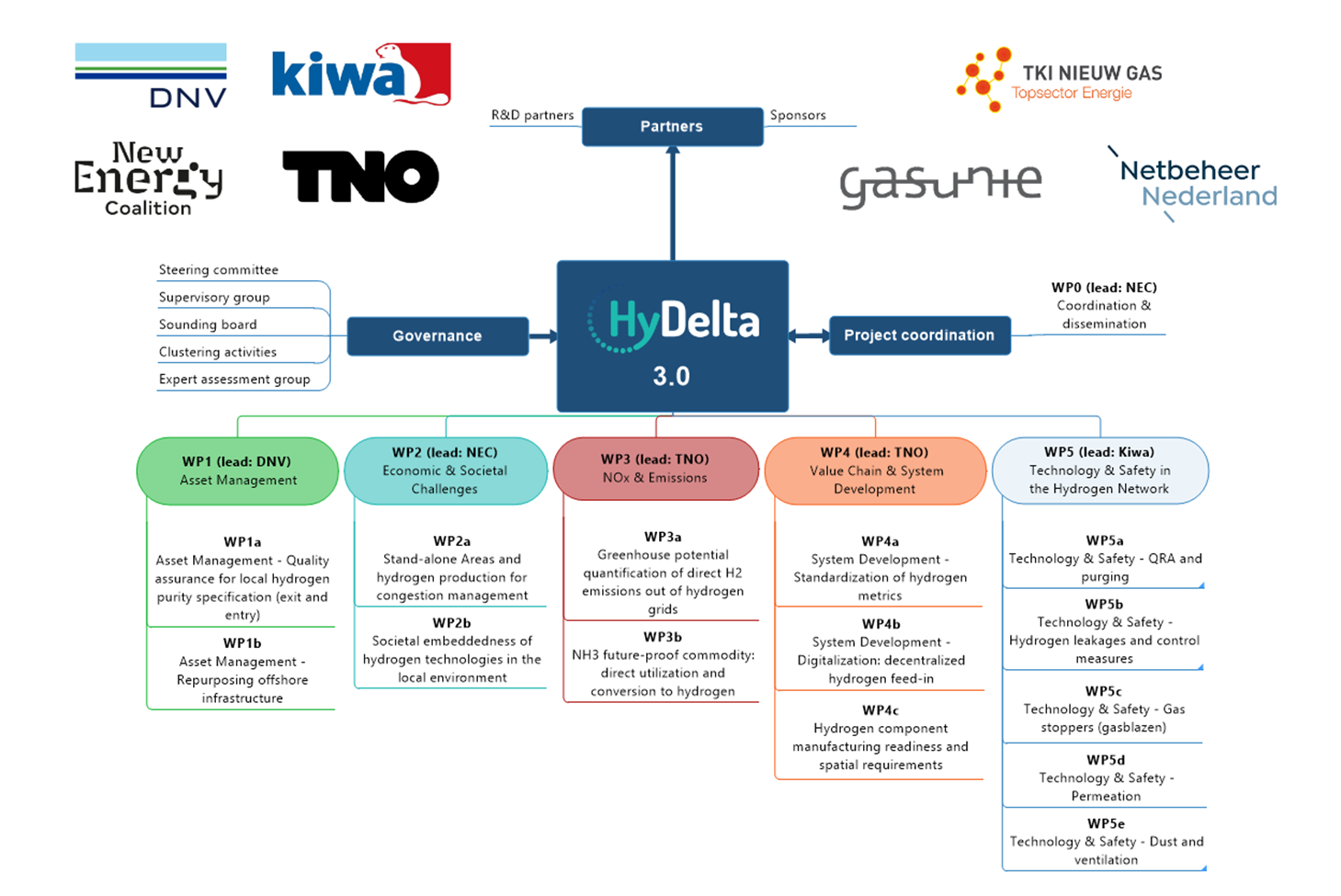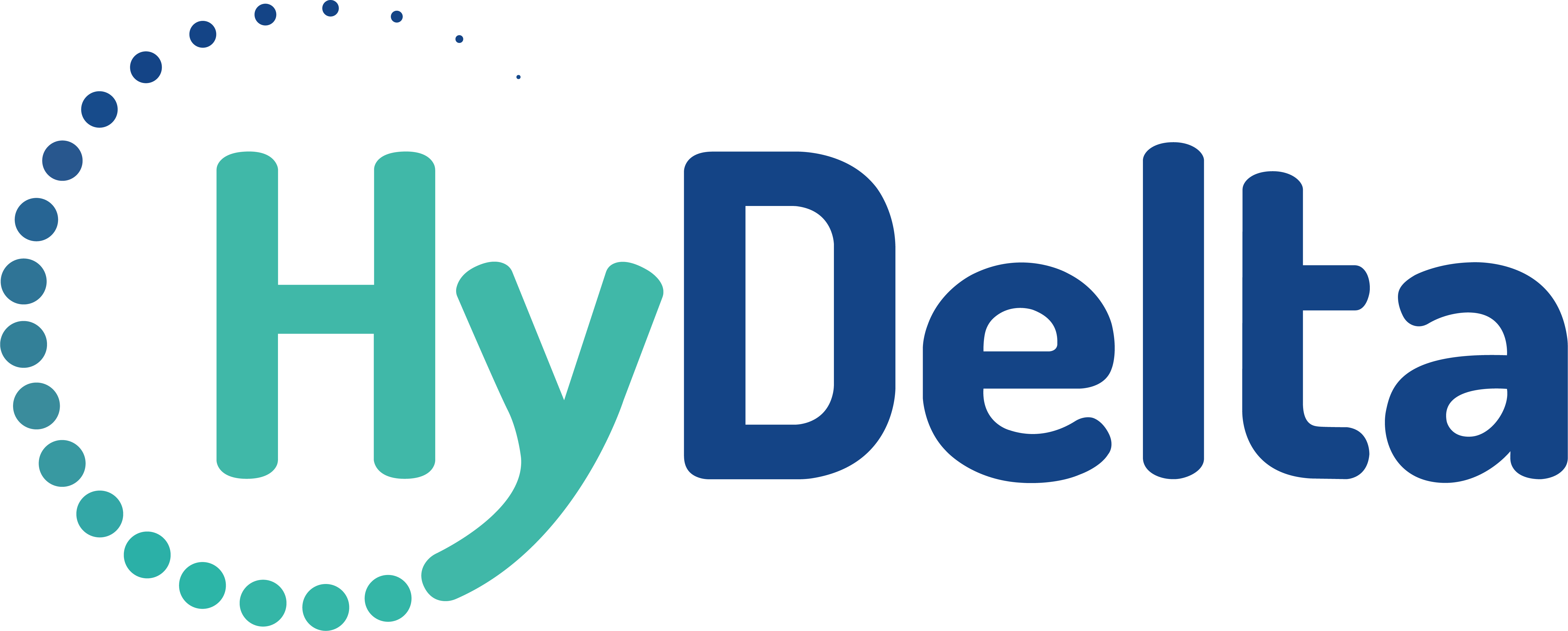HyDelta 3

Research programme
The HyDelta 3 programme is divided into work packages (WPs). Below is an overview of the research topics:
- Asset management
- Economy & society
- NOx & emissions
- Value chain & system development
- Technology & safety in hydrogen network
Asset Management
Below is a list of deliverables resulting from the aforementioned work packages, as well as a link to download them (when available):
WP1a: Asset Management (quality assurance for local hydrogen purity)
Summary: Development of entry and exit specification for hydrogen quality in a Dutch distribution network including monitor and control
| Number | Deliverable title | (Expected) Publication date | Link |
|---|---|---|---|
| D1a.1 | Overview of basic elements for hydrogen purity standards | July 2024 | Link |
| D1a.2 | How to deliver hydrogen purity in distribution networks; Strategies/Scenarios- Technical economic considerations and building blocks for monitoring and control protocols | November 2024 | Link |
WP1b: Asset Management (repurposing offshore infrastructure)
Summary: Gain insights into contaminants and available cleaning technologies, as well as which re-qualification criteria for offshore hydrogen pipelines
| Number | Deliverable title | Publication date | Link |
|---|---|---|---|
| D1b.1 | Cleaning protocols/practices for re-used offshore pipelines for hydrogen | May 2024 | Link |
| D1b.2 | Offshore pipeline requalification protocol | September 2024 | Link |
Economy & Society
Below is a list of deliverables resulting from the aforementioned work packages, as well as a link to download them (when available):
WP2a: Economy & Society (standalone hydrogen areas in the Netherlands)
Summary: Provide answers on if, and how standalone hydrogen areas can have a role in the roll-out of decentral hydrogen infrastructure in the Netherlands
| Number | Deliverable title | Publication date | Link |
|---|---|---|---|
| D2a.1 | Standalone hydrogen areas in the Dutch energy System and the role of RNB’s | March 2024 | Link |
| D2a.2 | Optimal regional hydrogen distribution from a societal perspective | May 24 | Link |
| D2a.3 | Factors determining the business case for electrolyzes in a standalone hydrogen area – case study | September 24 | Link |
WP2b: Economy & Society (Risk governance and societal embeddedness)
Summary: Analysis of the cross-cutting aspects (communication, stakeholder engagement and context) of risk governance in the hydrogen value chain (ranging from hydrogen transport via high- and low pressure networks and storage in salt caverns and porous media)
| Number | Deliverable title | Publication date | Link |
|---|---|---|---|
| D2b.1 | Literature review on how the cross-cutting aspects of risk governance affect societal embeddedness of hydrogen developments | March 2024 | Link |
| D2b.2 | Analysis of how and when the cross-cutting aspects of risk governance play a role in the societal embeddedness of hydrogen developments and where interdependencies occur | September 2024 | Link |
NOx & Emissions
Below is a list of deliverables resulting from the aforementioned work packages, as well as a link to download them (when available):
WP3a: NOx & Emissions – greenhouse potential of direct H2 emissions out of grids
Summary: Define Dutch DOSs and TSOs’ position on hydrogen emission reduction in transport and distribution grids by identifying potential hydrogen emission sources, quantities and recommendations for hydrogen emissions reduction measures
| Number | Deliverable title | Publication date | Link |
|---|---|---|---|
| D3a.1 | Type, Origin, and expected amount of hydrogen reduction | May 2024 | Link |
| D3a.2 | Priority and possibility of mitigating measures | May 2024 | Link |
WP3b: NOx & Emissions – NH3 direct utilization and conversion to hydrogen
Summary: Investigate into the ‘how’ of NH3 as a means for direct utilization and conversion to hydrogen by breaking down the practical implementation of renewable NH3 a s fuel source for ship fleets, identifying industrials that could benefit, assesses capacity requirements, and exploring NH3 cracking technology.
| Number | Deliverable title | Publication date | Link |
|---|---|---|---|
| D3b.1 | Factsheet ammonia cracking technologies (covering issues like typical capacities, TRL, Flexibility, associated emissions, breakthrough technologies and knowledge gaps | March 2024 | Link |
| D3b.2 | NH3 Direct utilization potential in the Netherlands | August 2024 | Link |
| D3b.3 | An overview of challenges of development of NH3 ship fleet | August 2024 | Link |
| D3b.4 | An overview of emissions associated with different NH3 supply chain | August 2024 | Link |
Value chain & System Development
Below is a list of deliverables resulting from the aforementioned work packages, as well as a link to download them (when available):
WP4a: Standardization of Hydrogen Metrics
Summary: Mapping and comparing metrics across the hydrogen value chain, identifying the most suitable metric/units options and how process of standardization should be put into practice
| Number | Deliverable title | Publication date | Link |
|---|---|---|---|
| D4a.1 | Roadmap to hydrogen metric standardization | September 2024 | Link |
| D4a.2 | Infographic hydrogen metrics | November 2024 | Link |
WP4b: Digitalisation: Decentralized hydrogen feed-in
Summary: Development of a controlling protocol for decentralized renewable gas feed-in for networks managed by the DSOs, including an ATO (Aansluit- en Transport overeenkomst) with feeders and system requirements.
| Number | Deliverable title | Publication date | Link |
|---|---|---|---|
| D4b.1 | Final Report on controlling strategies, monitoring, and smart sensor placement strategies | May 2024 | Link |
| D4b.2 | Report on controlling protocols and strategies | November 2024 | Link |
WP4c: Hydrogen component manufacturing readiness and spatial requirements
Summary: Clarifying the component manufacturing supply chain readiness and the spatial requirements of hydrogen related technologies that may be deployed in the Netherlands.
| Number | Deliverable title | Publication date | Link |
|---|---|---|---|
| D4c.1 | Assessment of hydrogen component supply chain readiness, scalability and resilience Spatial requirement contours of hydrogen projects | November 2024 | Link |
| D4c.2 | Spatial requirement contours of hydrogen projects | November 2024 | Link |
Technology & safety in the hydrogen network
Below is a list of deliverables resulting from the aforementioned work packages, as well as a link to download them (when available):
WP5a: QRA and Purging
Summary: Following up on the QRA modeling of Hydelta 2 by making specific calculations on the effect of risk mitigating actions, and assessing the effectiveness versus potentials risks of purging.
| Number | Deliverable title | Publication date | Link |
|---|---|---|---|
| D5a.1 | QRA of hydrogen in the build environment – effect of mitigating measures | November 2024 | Link |
| D5a.2 | Report on the best-practices, the need for purging and possible viable alternatives | November 2024 | Link |
WP5b: Hydrogen leakages and control measures
Summary: Provide an overview of potential risks and practical implications that a mechanic might faces in case of a leakage in the distribution grid, including preventive and corrective safety measures
| Number | Deliverable title | Publication date | Link |
|---|---|---|---|
| D5b.1 | Risk of hydrogen leakages in distribution grid in various situations | November 2024 | Link |
| D5b.2 | Practical preventive and corrective control measures to lower risks of hydrogen leakages | November 2024 | Link |
WP5c: Gas stoppers (gasblazen)
Summary: Investigating into the practical implications of using IPCO-type gas stoppers and giving insights into the effectiveness of double-block and bleed method in combination with flushing nitrogen
| Number | Deliverable title | Publication date | Link |
|---|---|---|---|
| D5c.1 | IPCO gas stopper resilience to hydrogen detonation | November 2024 | Link |
| D5c.2 | Effectiveness of double-block as additional safety measure | November 2024 | Link |
WP5d: Permeation
Summary: Gain insight into the potential safety risks and changes in hydrogen purity due to permeation over time at specific asset components in the distribution grid
| Number | Deliverable title | Publication date | Link |
|---|---|---|---|
| D5d.1 | Impact on safety and gas quality of permeation throughout distribution grids | November 2024 | Link |
WP5e: Dust and Ventilation
Summary: Investigating into the risk of self-ignition due to dust in a hydrogen gas flow, and possible ventilation hardware improvements to current gas stations operated with hydrogen
| Number | Deliverable title | Publication date | Link |
|---|---|---|---|
| D5e.1 | Potential of self-ignition of dusty hydrogen (research will be continued in HyDelta4) | August 2024 | N/A |
| D5e2 | Potential hardware fixes for hydrogen gas station ventilation | August 2024 | Link |

